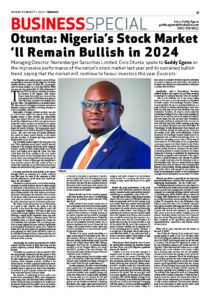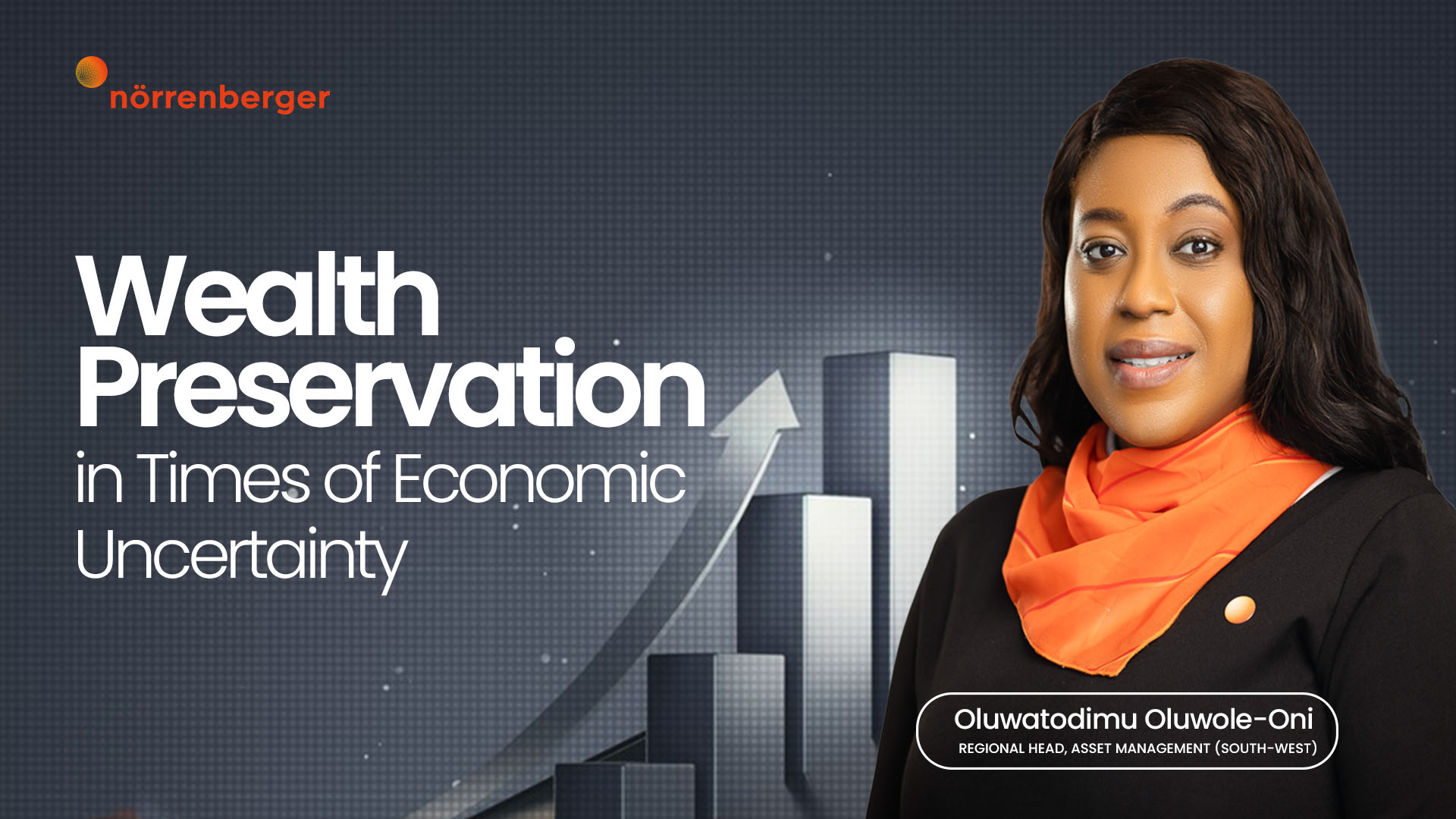
The Nigerian stock market posted a record 45.9 per cent growth as measured by the Nigerian Exchange Limited All-Share Index in 2023. The performance came to many analysts as a very big surprise. What can you say was responsible for this performance?
The year 2023 was indeed a mixed bag of emotions for investors in the Nigerian Stock market. Reason being that we had just come out from a pre-election year in 2022 where stock prices of major blue-chip companies were trading below their fair values. The apprehension of an election season 2023 also came with its negative sentiments as investors adopted a cautious approach to investing, shorting on stocks for liquidity preference. Participation of foreign portfolio investors was also on a low, so the market was starved of the required liquidity needed to drive demand and consequently, stock prices dipped. However, post 2023 elections and the fact that all predictions of doom and gloom came to nullity, this boosted confidence of investors in the market as once again, Nigeria had proven to be resilient politically despite her many challenges. The inauguration speech of the President of the Federal Republic of Nigeria also came with some pro-market sentiments that caused an instant positive reaction in the market and saw an influx of investors take long positions in fundamentally sound stocks which invariably caused a rally for the most part of the year. Policy statements around petrol subsidy removal, unification of the exchange rate etc. triggered investors appetite for these fundamentally sound stocks which were trading below their fair values. One other critical factor that drove activities in the stock market during this period was the dwindling interest rates in the money market, skyrocketing inflation rates nearing the 30% mark. In order to hedge again this rising inflation rates, investors turned to the stock market as that is a market that potentially can provide returns that exceed inflation rate and therefore help preserve investors capital.
It is often said that the stock market is the mirror through which an economy of a nation could be seen. But given the state of the economy in 2023 and the performance of the stock, how would you assess the correlation?
This assertion is quite apt and to a lot of market watchers, a mystery. In normal situations, the stock market actually is a barometer of the economy, but in our own peculiar circumstance, the disconnect rises from the fact that the factors driving activities in the stock market are at variance with what is happening in the real sector of the economy. All the factors earlier mentioned that drove stock prices could easily be predicted as a natural consequence to the policy statements made by the federal government. The market would always react to any information, be it good or bad. However, the reality in the real economy is that factors like rising inflation would still pose a significant challenge to the value of cash in the pockets of the average Nigerian. Issues around the country still being a largely import dependent nation that does not produce most of what it consumes persists. With the weakening Naira, it is always going to be a tough one for households and businesses. The purchasing power of the average Nigerian has been weakened significantly and consequently increased the misery index. Despite the bullish run in the stock market, the agelong fundamental issues plaguing the nation persists and this is a reason for the disconnect between investors excitement in the stock market versus the difficult times being experienced in the real sector of the economy.
Surprisingly, the market has maintained a bullish trend in the first month of 2024, how long can this positive trajectory continue. What are the sustaining factors?
The bullish run experienced in the second half of 2023 has unsurprisingly continued in this first quarter of 2024, one of the reasons being that following the passing of the 2024 budget into law, it is expected that government spending would stimulate economic activities in the various sectors, of which companies listed on the Stock Exchange in those sectors will be the better for it. Also, the earnings season are upon us and there is the anticipation by investors of good corporate actions that may arise from better-than-expected full year results. The activities of institutional investors such as the PFAs, Asset Management firms etc. has also helped drive activities in the market. Finally, the major participants in the market now are domestic investors and the market is yet to see an influx of foreign portfolio investors. Positions are also being taken on the mid to long term in expectations of another round of market rally when the foreign funds flow into the market. So, I expect to see periodic selloffs by investors who have hit their expected returns in the market, which would cause stock prices to dip, but then present an opportunity for bargain-hunters to take position in the market.
Despite the bull run in the secondary segment of the stock market, there was no corresponding upsurge in the primary market activities. Why was it so?
Sadly, activities in the primary market had not been as impressive as those in the secondary market. As a matter of fact, the market even experienced the delisting of about five companies in 2023. This could have been attributed to strategic decisions of the various companies and they cannot be begrudged for taking decisions in their best interest. Despite the recent bullish run in the market, there are investors who are still pessimistic about the market due to previous experiences and as such, Issuers fear that coming to the primary market to raise capital may not be so successful due to some investors’ apathy for the stock market. The fear of an equity capital raise failing is a major reason Issuers would rather go by way of debt issuances. However, there is an expectation that more primary market activities would occur this year by way of Rights Issues, Initial Public Offerings, Mandatory Take Overs etc. Of particular interest, would be to see the Dangote Refinery and maybe the NNPC get listed on the Stock Exchange. This will increase the market depth and improve investors’ confidence in the local bourse.
Although raising funding from the equities market is said to be relatively cheaper than the debt market, why are many companies not taking advantage of this to raise funds through equities issuances?
As earlier mentioned, one reason for the dwindling equity capital raise in the primary market is due to the fear of failure by Issuers. No company wants to come to the market to raise capital by parting with some of its shares and to not get it fully subscribed to. This can easily put the company in bad light that investors are not confident in its capacity to perform and are therefore not attracted to acquiring their shares. Also, equity capital raise means such a company is introducing many other investors to its company and public scrutiny of its performances would increase. For a company that wants to stay private, an equity capital raise may not be an option of them.
Despite the good performance of the stock market in 2023, which has extended to 2024, the market remained under patronized by investors considering our population, why is this so?
One major reason is that so many investors who had played in the stock market pre-2008 global meltdown, were not particularly savvy in the workings of the stock market. There was a massive bandwagon effect between 2006 and 2007, where investments were being made in the market without proper knowledge of how the market worked. Thus, during the 2008 global financial meltdown and the extended bearish run in the Nigerian Stock Market, some investors have not fully recovered from that experience. As a matter of fact, those who did not even play in the market then are using the stories of others to stay off the market. We also cannot discountenance the general economic hardship and its attendant effect on the purchasing power of citizens. It therefore is a tough ask to get people who are still trying to meet their basic needs, to part with scarce cash to invest in the stock market, which despite its high returns also comes with a high volatility.
What do you think should be done to make the market more attractive for investors because less than 10 per cent of the Nigerian population play in the market?
I believe a lot more of investor education is required across all strata of the populace. People need to understand the concept of investing in the stock market as a long-term investment, which over time can generate returns that hedge against inflation, thereby preserving their capital and creating wealth. Investors’ confidence would also be boosted when they are sure that there is a water-tight regulatory framework to protect their investments from any sharp practices in the market. This we must give credit to our apex Regulator, the Securities and Exchange Commission (SEC) and the Nigerian Exchange Group (NGX). Furthermore, more stockbroking firms must adopt the use of advanced technology in engaging with their clients, to provide a seamless engagement between their clients and the market. Finally, the issue around unclaimed dividends must be addressed as a matter of urgency, as it casts doubt in the minds of investors who invest in the market and have difficulties in getting their dividends.
Specifically, what is Norrenberger Securities Limited doing in this regard. Do you have products or strategies to onboard investors into the market?
Response: This is most definitely one of our unique selling points in this space, as we tout ourselves as simplifiers of wealth creation. At Norrenberger Securities Limited, we had identified this issue of unclaimed dividends as a major challenge for existing and intending investors who think that they may not get their dividends from their investments. Therefore, we created a service called the Norrenberger Heritage Service, where for all subscribers to this service, we help you recover all unclaimed dividends and even shares you did not know their whereabout. Some family members of a deceased loved one may not know that they may have hidden treasures in the large pool of unclaimed dividends more than N190 billion. At Norrenberger, we help clients unlock those treasures and work with them through the entire process of recovery and transfer of the assets to the beneficiaries of those investments. At Norrenberger Securities Limited, most of our engagements with our clients is technology driven. You can start the onboarding process online and buy and sell stocks online too. For every client of ours, we grant them access upon request to the Direct Market Access (DMA), which enables clients trade in the stock market themselves via their mobile devices or computers. We also believe in educating students in primary, secondary and tertiary institutions of learning to understand the fundamentals of financial management and investment. In this regard, we have a School Investment Club wherein we partner with a couple of schools across the federation to set up this investment club. This is to ensure that the younger generation learn early the habits of better managing their finances, which invariably will help guarantee parents that their wealth will be well managed in their absence. To further promote financial inclusion, we have enlightenment campaigns around marketplaces and associations of artisans.
What do you think is responsible for the impressive financial performance of most of the companies amid challenging environments. Are the results real?
The impressive financial performances so far released by some firms howbeit their interim results could be attributed to more companies better managing their overheads. So many companies are increasingly adopting a hybrid work model or completely going remote, thereby cutting a massive cost on energy, office maintenance etc. Some other companies are posting extraordinary incomes resulting from valuation of their FX investments, due to the devaluation of the Naira. In some other cases, a lot of domestic companies have enjoyed increased patronage due to the FX scarcity and ballooning exchange rate, which has made importation of goods and services more expensive. So, consumers have turned to more local options of similar goods and services, which they hitherto may have had to patronize those from abroad. This particularly is the case with some listed companies in the agricultural, pharmaceutical, telecommunication, construction, and financial sectors of the economy.
What will be your projection for the market at the end of 2024?
Year to date, the Nigerian Stock market has broken several barriers in terms of the NGX All Share Index (NGX ASI) hitting new milestones and currently standing above the 100,000 psychological mark for the first time in its history. This has seen the Nigeria Stock market as the best performing market in the world, followed by Argentina. I believe this trend will continue due to a couple of factors such as the activities in the money market, that is declining rates, investors who are rate-sensitive and have some level of risk appetite, would opt for the stock market as an alternative. Should the inflation figures keep trending upwards, the natural instinct for investors would be to try to hedge against it and the stock market presents a good opportunity to achieve that. Also, at some point in the year, all things being equal, there most likely would be an inflow of foreign portfolio investors into our market, especially with a stability in our FX regime. This will help drive demand for stocks and subsequently another round of bullish momentum. Overall, the year is expected to see the market offer returns above those of any fixed income instruments, but investors must also act with a cautious sentiment. Clear investment objectives must be set, with respect to entry and exit plans. Greed must be avoided in this market at all cost.
Source: THISDAY









